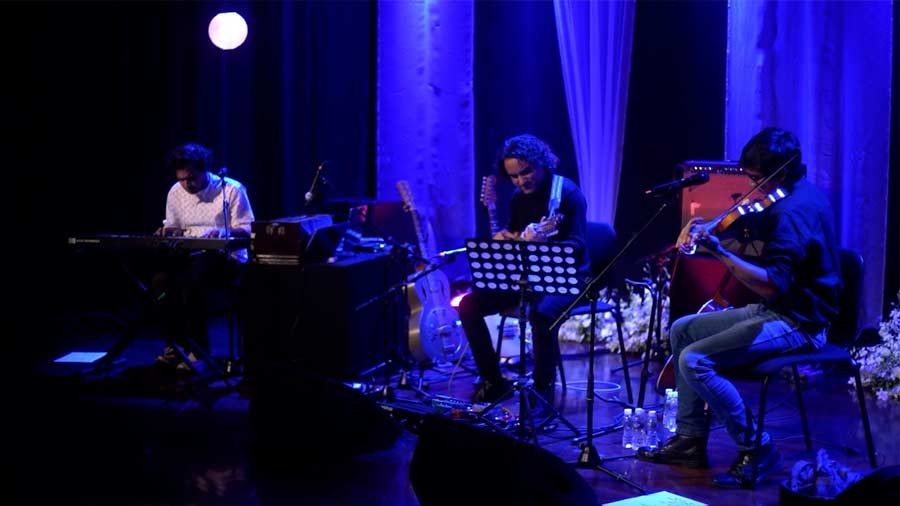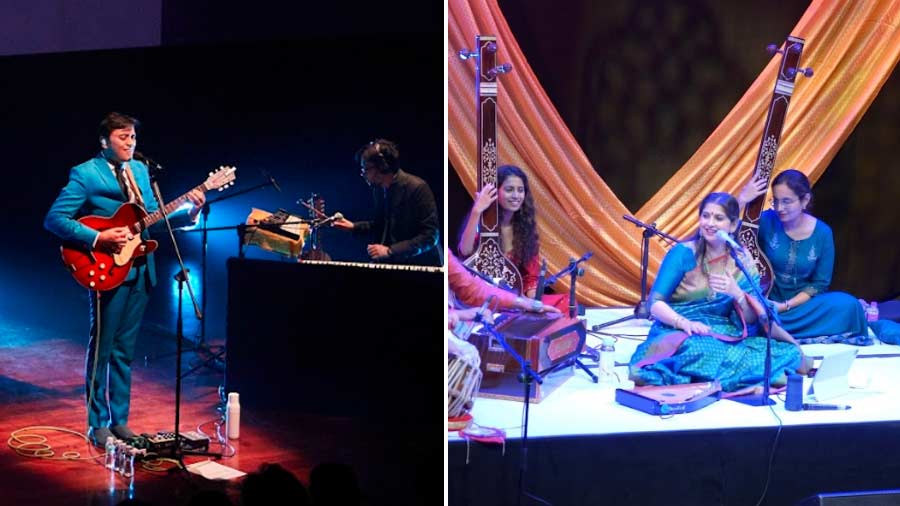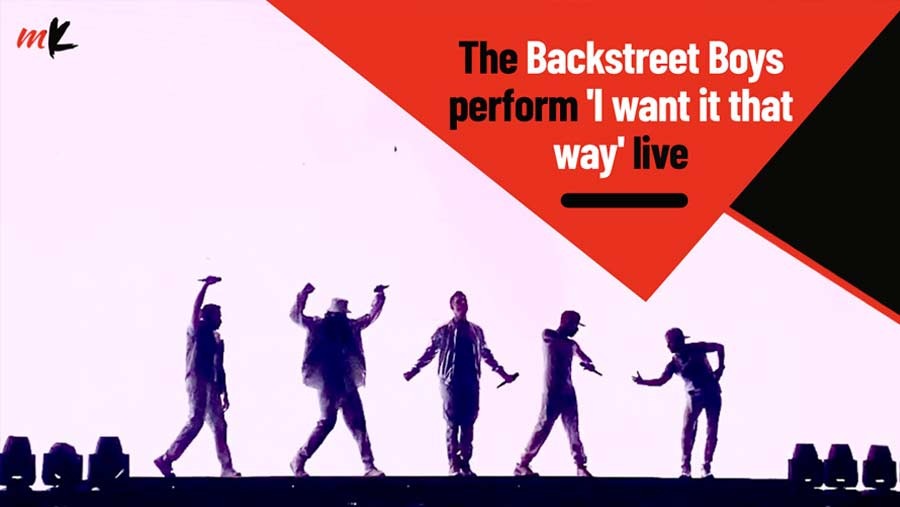One of the spaces at the newly-inaugurated Nita Mukesh Ambani Cultural Centre (NMACC) in Mumbai, is a cosy hall called The Cube. With 120 chairs, it allows the audience to soak in a performance and lose itself in the intimacy of the setting, the artists and the magic of the moment. On May 20, Tajdar Junaid, a musician from Kolkata, performed “some short arrangements, long arrangements and unknown arrangements” along with some new and familiar songs. He was accompanied by another Kolkata-trained musician, Bhaskar Dutta, and Mumbai-based keyboardist, Rohan Rajadhyaksha. With the first show sold out, the trio performed twice on the same evening. While the solo pieces enchanted the audience, it was songs from The Beatles, Mohiner Ghoraguli and even the soundtrack of a Ritwick Chakraborty-starrer that made My Kolkata feel right at home. We caught up with the musicians after the concert.

Tajdar Junaid (centre) with the ronroco, Rohan Rajadhyaksha on keyboard and Bhaskar Dutta on the violin
Anyone familiar with Tajdar’s music will recognise the dreamlike quality of his melodies — a feeling he encapsulates in the playful naming of his first album What Colour Is Your Raindrop. “The album and the song name came from the place where we think… ‘This is mine… this is my water…’ But water is something that takes the shape of everything. So when it rains, you cannot say, ‘This is my half of the rain and that is yours.’ Rain happens to everyone. So why differentiate between so many things?” he asked, philosophically.
Curiosity did not kill the composer
Tajdar began the evening at NMACC with Devotion, a piece he plays on the ronroco, a South American string instrument. It’s yet another instrument he taught himself to play, after guitar lessons of his youth with virtuoso Amyt Datta, in Kolkata. “I am a curious musician,” explained Tajdar. “I was curious to know what instrument was used in the soundtrack for the movie, The Motorcycle Diaries. It was the charango, and that led me to the knowledge that South America’s folk instrument is equivalent to the sitar or the sarod over here. I wrote to a luthier in a village in Bolivia who assured me that they would be able to deliver in a week’s time but it took about three months to come! From one instrument to the other, I was just curious about what other cultures sound like and how I can place that in my music.”
The repetitive chords of Devotion seek to lead us to some sort of peace. Having composed the piece during a period marked by the quest to find God in his music, Tajdar concluded that, “once I bow down to the instrument it just leads me to a peaceful place and that is where I am looking for The Almighty.”
Music from the movies
Tajdar described his pieces as being “a blend of films, music, and people that I love.” The evening at NMACC evoked three movies.
The first was Dhuin (2022), for which Tajdar composed the original soundtrack. For his fans in The Cube, he recreated an improvised, more elaborate version, while keeping the recognisable main melody intact. “What comes before or after that,” he said, “depends on how I am feeling in the room at that time. The air that I am breathing, the people around me… is it a pin-drop silent room or is there a little hustle and bustle.” His last untitled solo is similarly improvised in the moment. “I am curious, I want to be surprised. I don’t want to know what the next note is,” insisted Tajdar.
The second movie, Paris, Texas (1984) made an appearance because Ry Cooder, the composer of the original soundtrack (played on a steel guitar) has always been a Junaid favourite. But that’s not the only reason the music made it to the playlist. “The practical reason behind choosing the song was that I got to play my Dobro (a steel resonator guitar), which is 8kg and I can’t travel with it to other cities,” said Tajdar, who was accompanied by keyboardist Rohan for this one. “Taj and I share a love for film music. It’s something I grew up aspiring to do, which might explain the cinematic influences in my own songs,” said Rohan, who is part of the Salvage Audio Collective team, which provides 360-degree audio solutions for a wide range of professional media.
The third movie, The Violin Player (2015) by Bauddhayan Mukherji, starring Ritwick Chakraborty, presented a poignant violin solo by Bhaskar Dutta who had composed the solo violin pieces for the film. He went on to recreate The Last Cadenza, which was nominated for Best Music (Original Song) at the Rapid Lion South African International Film Festival in 2017. Now a finance journalist in Mumbai, Bhaskar, who learnt to play the violin under the tutelage of maestro Abraham Mazumder in Kolkata, introduced the piece as a “tribute to the composers I grew up with and above all my teacher who introduced me to this.”
A note of romance: Is music the language of love?
Tajdar’s introspective solos set the mood for a dash of romance. First Year, one of his original instrumentals, tries to “imagine what the first year is like when people come together, what the first year is like for a child, or after losing someone,” explained Tajdar, who composed the piece while trying to reflect on the first year of a romance going awry. While the emotive tones of the violin spell out the sentiment in this one, Tajdar’s earnest song, Though I Know, is melodious poetry in its slower rendition of the original.
Rohan’s soulful solo, Love Don’t Call Me, on the harmonium turned out to be an unreleased song he’s never played before. “This was one of many songs I wrote during the lockdown. It’s a little different from the rest because it has an inherently Indian melody and chord structure. I thought the piece worked well with Taj’s music,” said Rohan.
For Tajdar, music is not just the language of love, but language itself. “It’s the music that comes first. The music dictates how things will fall in place,” said the guitarist, who gave his audience cues by telling us that Faasla is the time and distance between people and places and Dastaan is about a journey. The dips and peaks of the former help to imagine the rhythmic passage of time, while the urgency of chords in the latter could take us down a galloping road. The intimate setting of The Cube allowed discerning members of the audience to keenly follow the fingerwork of the musicians before them, whether it was the intricate plucking of the ronroco, the vibrato on the violin or even the breathwork which kept the melodica going.
Kolkata Chords
Music was always a part of Tajdar’s youth. He lived down the road from Carlton Kitto, took guitar lessons from Amyt Datta, played at Someplace Else and went on to teach guitar at The Calcutta School of Music. He skipped classes in college to spend time in a friend’s rehearsal pad replete with electric guitar and pedals, and met other musicians who introduced him to the infectious sound of Bangla Rock.
Tajdar’s early musical influences from his formative years in Kolkata featured prominently in the concert. He admitted that when he went to Carlton Kitto, he was “obnoxious. I told him I didn’t want to learn jazz because it just flew over my head. It was so complex that at the age of 15, I did not know what was going on. He told me, ‘Go to Amyt’ and I asked, ‘Who is Amyt?’ The answer to that brash question changed everything for the teenager from Calcutta Boys’ School who only wanted to play Stairway to Heaven.
At NMACC, Tajdar gave in to his Beatlemania, where he took the lead for In My Life with the other two on backing vocals. For Eleanor Rigby, the instantly recognisable melody was played by Bhaskar on the violin with an energetic improvisation by Tajdar on guitar while the riveting tempo section was provided by Rohan. Tajdar reminded the audience, more than once, that both songs are from the “best band ever”. Move over, Led Zeppelin.
Slide in, Mohiner Ghoraguli.
“This song (Chai Na Ja Pai) essentially explores the human condition of not wanting what you get and not getting what you want,” explained Bhaskar, who introduced Mohiner Ghoraguli to the Mumbai audience as “arguably the pioneers of Bengali rock music, which started out in the 1970s in Calcutta and then went on to spawn generations of singers, songwriters, musicians, filmmakers.” Rohan, who has not grown up with the songs of Mohiner Ghoraguli, agreed that there is a universality to the music. “As soon as Taj and Bhaskar shared the music with me, I was quite enamoured by it. The chords follow traditional western changes and I found flavours of gypsy music in the song, which made perfect sense to me,” said Rohan.
Bhaskar, whose violin teacher, Abraham Mazumder, was the youngest member of Mohiner Ghoraguli, is no stranger to these songs; as Kolkata music aficionados will know, popular numbers such as Bhalobashi often pop up in Mazumder’s otherwise Mozart-heavy concerts. With Tajdar on guitar, Rohan on the melodica and Bhaskar on vocals, Chai Na Ja Pai brought the evening to a rollicking end.

Parekh & Singh and Kaushiki Chakraborty are amongst many other performers from Kolkata who have performed at NMACC

